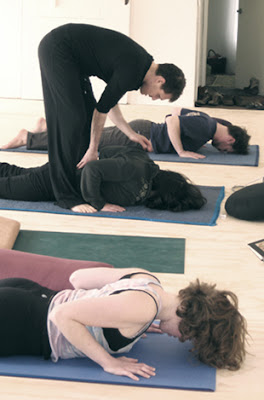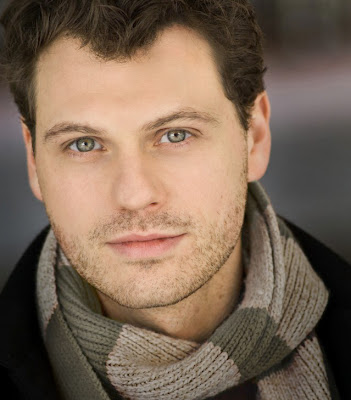Post by Peggy Baker
all of us REALLY feeling the effects of the "world's most beautiful sit-ups"
yes, strangely and surprisingly powerful
a super condensed and vigorous warm-up
Deb's music distracting us from the labour of exertion is the most wonderful way
so much accomplished in four sessions
and so many possibilities suddenly opening for expansions and developments of the projects we embarked on
but time is up
maybe more sessions next time?...
looking forward to seeing all of these terrific actors on stage!
The Volcano Conservatory
Thursday, 4 August 2011
Thursday, 28 July 2011
Inside the Conservatory: Viewpoints with Michael Greyeyes
Post by Conservatory student Tara Beagan
Michael Greyeyes has harnessed this incredible moment in his Viewpoints classes. He introduced the 2011 Volcano sessions with it, and he brought the small group back to it at the start of each day. Every body poised to take a collective step. Listening, feeling, and breathing in harmony with artists hardly known to you, there is a communing.
You know that moment, sitting in a theatre, when the house lights dim noticeably, and the whole room scrambles to turns ringers off, stash the program, or stow a bulky winter jacket comfortably? The murmurs settle ever further down until there is a shared breath of silence – an expectant inhale. In that brief moment lives potential. For that dark and delicious second or two, every capacity held by human life hovers in the air, offering itself for the taking.
When a class begins with this feeling, you know it’s going to be worth your while. It was. Do yourself a favour and find out for yourself, next year.
Michael Greyeyes has harnessed this incredible moment in his Viewpoints classes. He introduced the 2011 Volcano sessions with it, and he brought the small group back to it at the start of each day. Every body poised to take a collective step. Listening, feeling, and breathing in harmony with artists hardly known to you, there is a communing.
You know that moment, sitting in a theatre, when the house lights dim noticeably, and the whole room scrambles to turns ringers off, stash the program, or stow a bulky winter jacket comfortably? The murmurs settle ever further down until there is a shared breath of silence – an expectant inhale. In that brief moment lives potential. For that dark and delicious second or two, every capacity held by human life hovers in the air, offering itself for the taking.
When a class begins with this feeling, you know it’s going to be worth your while. It was. Do yourself a favour and find out for yourself, next year.
Peggy's Wednesday
Post by Peggy Baker
adding some work down on the floor to intensify the warm-up material
complex patterns traveling forward, sideways and backwards along a circular pathway
super vigorous
realized the fans had been off for more than 90 minutes
beginning to investigate relationships among the actors during the intricate floor patterns developed walking "personal maps"
something powerful suddenly emerging through the action/interaction
Wednesday, 27 July 2011
Peggy's Tuesday
Post by Peggy Baker
exerting our muscles and raising our heart rates to warm-up, to increase mobility, and to strengthen our bodies
working with facings rotating off and around the leg we're standing on
working with circular pathways on the horizontal plane: feet, pelvis, rib cage
trajectories forward, back, and side along pathways oriented to a downstage edge
staccato punctuation to break a state and clean the expressive slate
exerting our muscles and raising our heart rates to warm-up, to increase mobility, and to strengthen our bodies
working with facings rotating off and around the leg we're standing on
working with circular pathways on the horizontal plane: feet, pelvis, rib cage
trajectories forward, back, and side along pathways oriented to a downstage edge
staccato punctuation to break a state and clean the expressive slate
Peggy's Monday
Post by Peggy Baker
focusing on action and rhythm to warm-up with generous range of motion in a very small space
a democratic idea of about where/what is front
Deb on a drum kit framing our group movement with a fluid idea of time
a quick mapping of our passage through life thus far and by the end of two hours everyone had danced in unison, randomly together and then alone
focusing on action and rhythm to warm-up with generous range of motion in a very small space
a democratic idea of about where/what is front
Deb on a drum kit framing our group movement with a fluid idea of time
a quick mapping of our passage through life thus far and by the end of two hours everyone had danced in unison, randomly together and then alone
Inside the Conservatory: 2 Days of Movement for Actors
Post by Conservatory student Mackenzie Muldoon
I have just traced a diagram of my path in my notebook. It is the path I created from the ideas Peggy Baker fed us and it is a path that jumps around the globe, the continent and the GTA. In my notebook it looks like a very abstract version of connect the dots. I love that Peggy is leading us to create in ways I would never have considered and yet that seem to come so naturally from within. As I look around the room to see what others are finding I am in awe of the beauty coming from each and every one of my classmates. Yet, it seems so effortless. Okay, okay...alright. ;0)
Tuesday, 26 July 2011
Fitzmaurice Voicework
Post by Noah Drew
I’ve just arrived in Toronto, after a week in Barcelona at the first international conference of Fitzmaurice Voicework.
Founder Catherine Fitzmaurice and Master Teacher Saul Kotzubei, about 15 Associate and Assistant Teachers (including myself), and around 40 workshop participants from all over the world gathered at the Barcelona Institut De Teatre. Sessions were taught in both English and Spanish, with smatterings of Catalan, French, Russian, German and Japanese bubbling up here and there as people worked.
In the evenings, there were performances which ranged from naturalism to stylized imagistic theatre, in voices that were sometimes simple and authentic, sometimes soaring, sometimes wild, animal-like song. Sometimes breath was the only voice... and the breath was itself a whole language.
Fitzmaurice Voicework is very much about allowing your own moment-to-moment experience -- your spontaneous individuality -- to be present in your voice, so that the listener feels connected to you when you speak.
Looking ahead to the weekend of teaching at the Volcano Conservatory, I find myself thinking a lot about the idea of community. Because it’s actually, in many ways, what the voice is for. We have this tiny organ in our throats that has the astonishing ability to translate what we are thinking, feeling and imagining through the air and into the bodies of people around us.
When we speak or sing, our bodies and the bodies of our listeners vibrate together, move in sync on a cellular level. And this shared vibration -- when it is allowed to be full of ourselves, our needs, our longings, our humour, our passions and our brilliance -- does something simple and remarkable: it helps us be less alone.
But here’s the thing... we live in a culture in which many of us have learned from a very young age that certain sounds are not okay, because the feelings and ideas those sounds carry are inappropriate. For some of us, it might be that sadness seems weak; for others, aggression is taboo; for some of us, anxiety or confusion are shameful; for others, it might be our sexual energy that we’ve learned to suppress in many circumstances. Et cetera. So we have learned to sculpt our vocal sounds to keep these feelings and energies out of the voice. But that’s hard to do, since the basic physiological function of the voice is to reveal what we’re experiencing. So, many of us have learned to lock away or put to sleep the parts of our bodies that feel the forbidden feelings, to not experience certain parts of ourselves at all. Problem “solved."
Oddly (and frustratingly), this can sometimes be especially true in performers. As we learn vocal skill (“good” singing sound, for instance, or “good” articulation), it can be so comforting to have a “correct” way of making sounds that we sometimes end up showing our skills rather than revealing our selves -- vocal training actually helps some of us hide more effectively. The result may well be a voice that is impressive. But without spontaneous honesty being allowed into the mix, that impressive voice rarely moves us.
In this weekend of Fitzmaurice Voicework, we’re going to fold and unfold the body in some ways that will help us reawaken parts of ourselves that may have become numb or frozen. We’re going to work on letting the breath be free and responsive so that our vocal work is alive and spontaneous (Catherine likes to say, “Breathing is meaning!”). And we’ll work on allowing more and more of our selves, our humanity, into the sounds we make. We’re going to investigate how to let the voice truly be a conduit between performer and listener, a kind of field that excites us together, calms us together, moves us together. We want our audience to listen, and feel like, “Something that matters is happening RIGHT NOW. And I’m a part of it.”
I’ve just arrived in Toronto, after a week in Barcelona at the first international conference of Fitzmaurice Voicework.
Founder Catherine Fitzmaurice and Master Teacher Saul Kotzubei, about 15 Associate and Assistant Teachers (including myself), and around 40 workshop participants from all over the world gathered at the Barcelona Institut De Teatre. Sessions were taught in both English and Spanish, with smatterings of Catalan, French, Russian, German and Japanese bubbling up here and there as people worked.
In the evenings, there were performances which ranged from naturalism to stylized imagistic theatre, in voices that were sometimes simple and authentic, sometimes soaring, sometimes wild, animal-like song. Sometimes breath was the only voice... and the breath was itself a whole language.
Fitzmaurice Voicework is very much about allowing your own moment-to-moment experience -- your spontaneous individuality -- to be present in your voice, so that the listener feels connected to you when you speak.
Looking ahead to the weekend of teaching at the Volcano Conservatory, I find myself thinking a lot about the idea of community. Because it’s actually, in many ways, what the voice is for. We have this tiny organ in our throats that has the astonishing ability to translate what we are thinking, feeling and imagining through the air and into the bodies of people around us.
When we speak or sing, our bodies and the bodies of our listeners vibrate together, move in sync on a cellular level. And this shared vibration -- when it is allowed to be full of ourselves, our needs, our longings, our humour, our passions and our brilliance -- does something simple and remarkable: it helps us be less alone.
 |
| Noah Drew teaching Fitzmaurice Technique |
Oddly (and frustratingly), this can sometimes be especially true in performers. As we learn vocal skill (“good” singing sound, for instance, or “good” articulation), it can be so comforting to have a “correct” way of making sounds that we sometimes end up showing our skills rather than revealing our selves -- vocal training actually helps some of us hide more effectively. The result may well be a voice that is impressive. But without spontaneous honesty being allowed into the mix, that impressive voice rarely moves us.
 |
| Noah Drew |
Subscribe to:
Posts (Atom)








